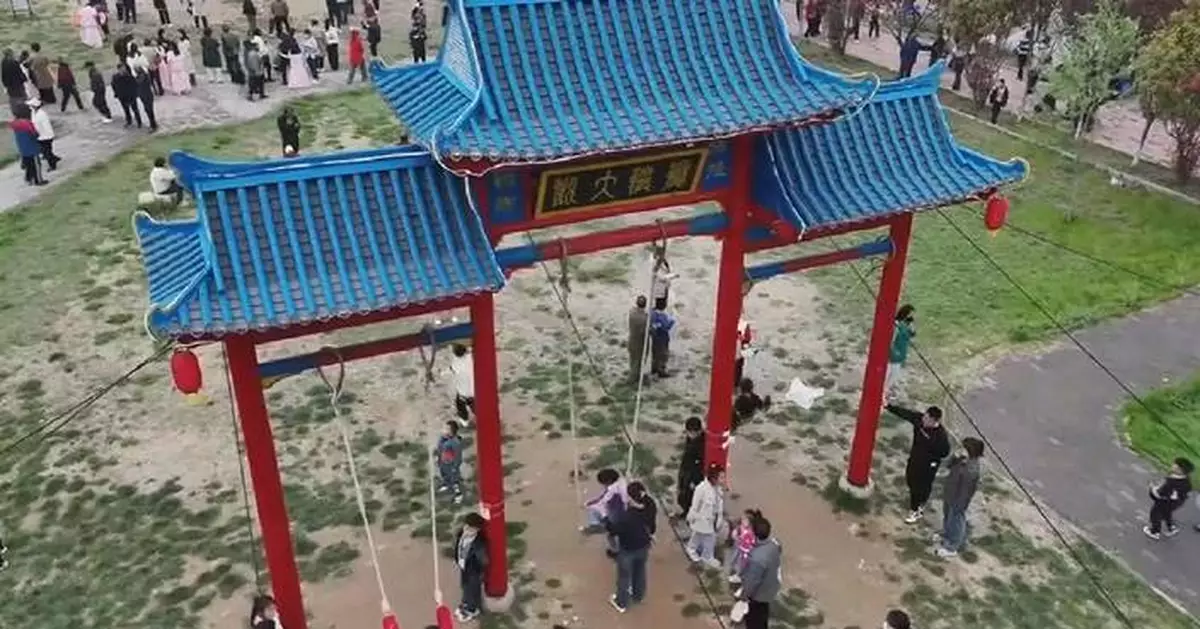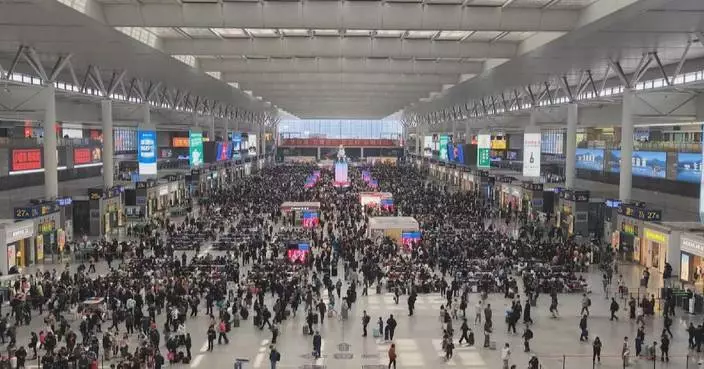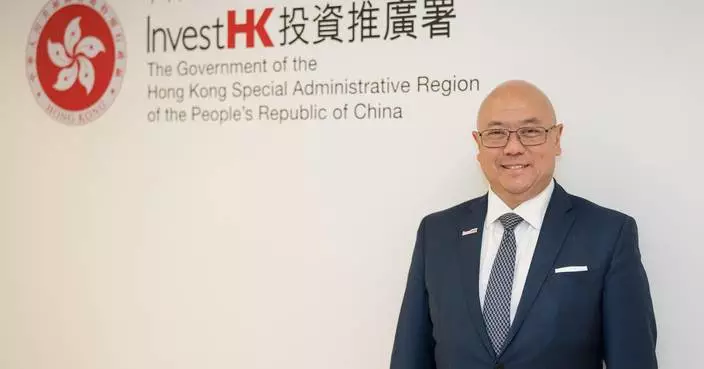As the Qingming Festival approaches this Friday, various traditional folk activities have been held across China, celebrating the rich cultural heritage of the occasion.
With a 2,500-year history, Qingming Festival, or the Festival of Pure Brightness, observed in early April, uniquely combines ancestral worship with the celebration of spring. Falling on the 15th day after the spring equinox, this ritual-rich observance reflects China's enduring values of ancestral veneration and inspires deep introspection about what gives life meaning.
In Sijia Village, Huayin City, northwest China’s Shaanxi Province, a unique swing festival is held to mark the occasion. Eighteen different types of traditional swings, such as the spinning wheel swing, the Bagua swing reminiscent of a rotating carousel, and the balance swing designed for two people, have attracted many visitors.
Historically, Sijia Village served as a military post guarding the strategic Tongguan pass, a former mountain pass and fortress located south of the confluence of the Wei and Yellow Rivers. The swing tradition in the village has its origins in military training exercises like climbing and river crossing. The local swing culture further developed as regional trade flourished, eventually evolving into the "swing festival" that continues today.
"It's very exciting and tests your skill, endurance, and most importantly, your arm strength. You need to maintain balance," said Qu Xiangyang, a visitor.
In Rudong County, Nantong City, east China's Jiangsu Province, another traditional Qingming activity takes place - kite flying.
Flying kites as a way of making wishes is an age-old Qingming custom in this region. As a result, the Qingming Festival in Nantong is also known as the "Kite Festival."
The local Banyao whistling kite making skills is listed as one of the first national intangible cultural heritage items.
According to a folk culture expert, people traditionally write the names of diseases or misfortunes on paper, attach it to a kite, and release it into the sky. This practice is believed to drive away illness and disaster, while also serving as a way to make wishes.
In south China's Guangdong Province, a large tug-of-war competition is underway in Maoming City. Teams from different towns and streets are competing, attracting many locals to cheer on their teams.
Tug-of-war, which originated during the late Spring and Autumn period (770 BC - 476 BC), became part of Qingming customs during the Tang Dynasty (618-907). Emperor Xuanzong of the Tang Dynasty once organized large-scale tug-of-war competitions for the festival.
"Tug-of-war became very popular in the Tang Dynasty, even emerging as the national sport. It originated in the Jingchu region and later spread across the country. In ancient Lingnan (Southern China), tug-of-war games were a common tradition. Through these events, people seek to pray for peace, prosperity, and abundant harvests," said Yao Guojun, vice dean of the College of Arts and Law, Guangdong University of Petrochemical Technology.
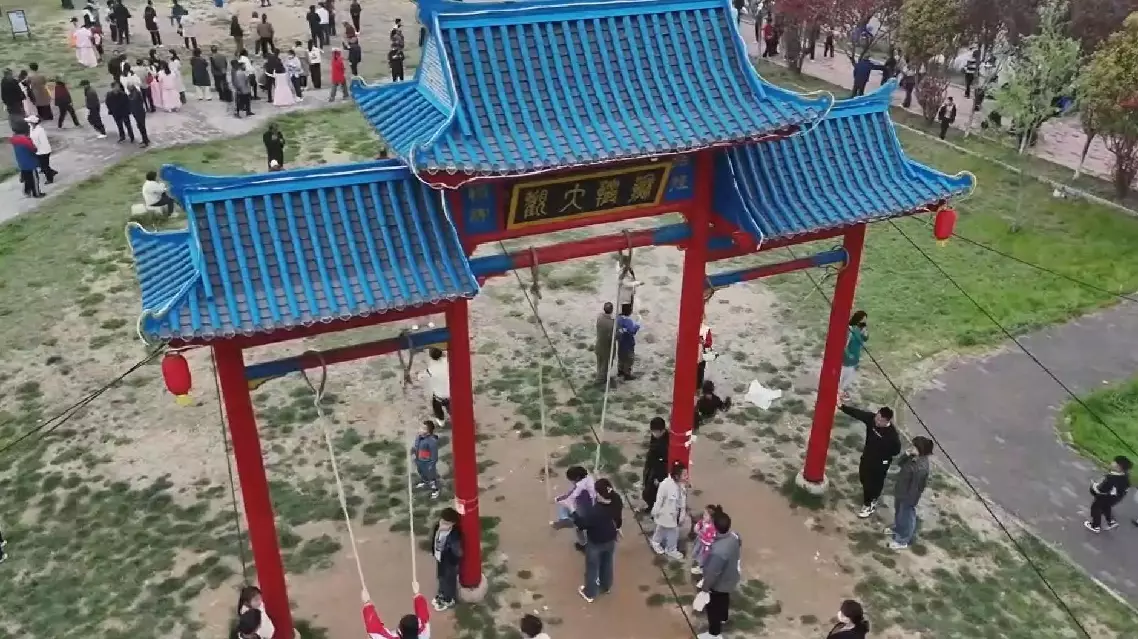
Traditional folk activities held for Qingming Festival
China will firmly fight against economic hegemony, advocate justice, and stick to the right path against the sweeping tariffs by the United States, and will open ever wider to the world no matter how the international situation changes, according to a commentary of The Real Point published on Sunday.
An edited English version of the commentary is as follows:
In response to the U.S. imposition of "reciprocal tariffs" on all trading partners, China issued the Chinese Governments Position on Opposing U.S. Abuse of Tariffs on Saturday, after taking a series of countermeasures.
The thousand-word document pointed out that the United States uses tariffs as a weapon to exert extreme pressure and pursue its own selfish interests, which is a typical act of unilateralism, protectionism and economic bullying.
The paper also emphasized that China does not provoke trouble but is not afraid of trouble, and will continue to implement a high-level trade and investment liberalization and facilitation policy to share development opportunities and achieve mutual benefit and win-win results with countries around the world.
Li Haidong, a professor at China Foreign Affairs University, told The Real Point that this position paper demonstrates China's high sense of responsibility to uphold fairness and justice without fear of power politics, which will be conducive to the efforts of the international community to pool together resultant forces and continue promoting economic globalization.
Meanwhile, China's determination to promote high-level opening-up has boosted the courage and confidence of other countries to fight against unilateral bullying and injected certainty into a changing and turbulent world, according to Li.
There are no winners in a trade war and there is no way out for protectionism. When the U.S. complains that the whole world is taking advantage of it, it deliberately distorts a fact that the U.S. is the biggest beneficiary of the world's free trade system since the end of World War II.
Since the establishment of diplomatic relations with China in 1979, the United States has long been reaping substantial profits from its economic and trade ties with the country. More than 70,000 American companies have invested and started businesses in China, and exports to China supported 930,000 jobs in the United States, which maintained a huge surplus in service trade in particular.
According to data from the U.S. Bureau of Economic Analysis, in 2023, the United States exported 46.72 billion U.S. dollars in services to China, and had a trade surplus of 26.57 billion U.S. dollars in services with China.
The Economist criticized the current U.S. trade policy for ignoring the unprecedented prosperity that globalization has brought to the United States.
The U.S. arbitrarily uses tariffs to blackmail other countries at will, attempting to sacrifice the interests of the whole world for U.S. hegemony. But any exertion of pressure and intimidation are useless to China.
This year, in the face of the continuous tariffs imposed by the United States, China has introduced a series of precise and effective measures, as one of the first countries taking countermeasures. The country's move is not only to safeguard its own sovereignty, security and development interests, but also to defend the multilateral trading system and international trade rules.
The world is not a jungle society, and everything must be fair and just. Development is a universal right of all countries in the world, not an exclusive right of a few countries.
The United States has unilaterally imposed tariffs on all its trading partners, violating the WTO's Most-Favored-Nation treatment principle and attempting to subvert the existing international economic and trade order. Its nature is to pursue "America first" and "America special" and deprive other countries of their legitimate right to development.
Over the past days, the European Union, France, the United Kingdom, Italy, Japan, Australia, Singapore, South Africa, Canada and other countries have been criticizing the United States.
China's position paper clearly states that "international affairs should be addressed through consultation, and the future of the world should be decided by all countries", reflecting the common aspirations of the international community and China's consistent position of speaking and doing fair things.
While the United States continues to build "high walls around a small yard" and erect tariff barriers, China is constantly "opening its doors" and "building bridges and roads" to bring more opportunities to the world.
On March 28, Chinese President Xi Jinping met with representatives of the international business community in Beijing and reiterated that China is determined to promote reform and opening up, China's door will only open wider, and China's policy of welcoming foreign investment has not changed and will not change.
The China Development Forum 2025, held in Beijing from March 23 to 24, attracted more than 80 representatives of multinational companies, among which American companies made up the largest proportion, reaching about one-third.
A report released by global management consulting firm Kearney shows that in the ranking of foreign direct investment confidence in the next three years, China has jumped from 7th to 3rd, and ranked first in the special ranking of emerging markets.
At a time when the world is in turmoil and the United States is abusively imposing tariffs, China's position paper sends a strong message to the world about maintaining the multilateral trading system and promoting economic globalization.
The world wants justice, not hegemony. This is China's clear declaration and the common voice of the international community.
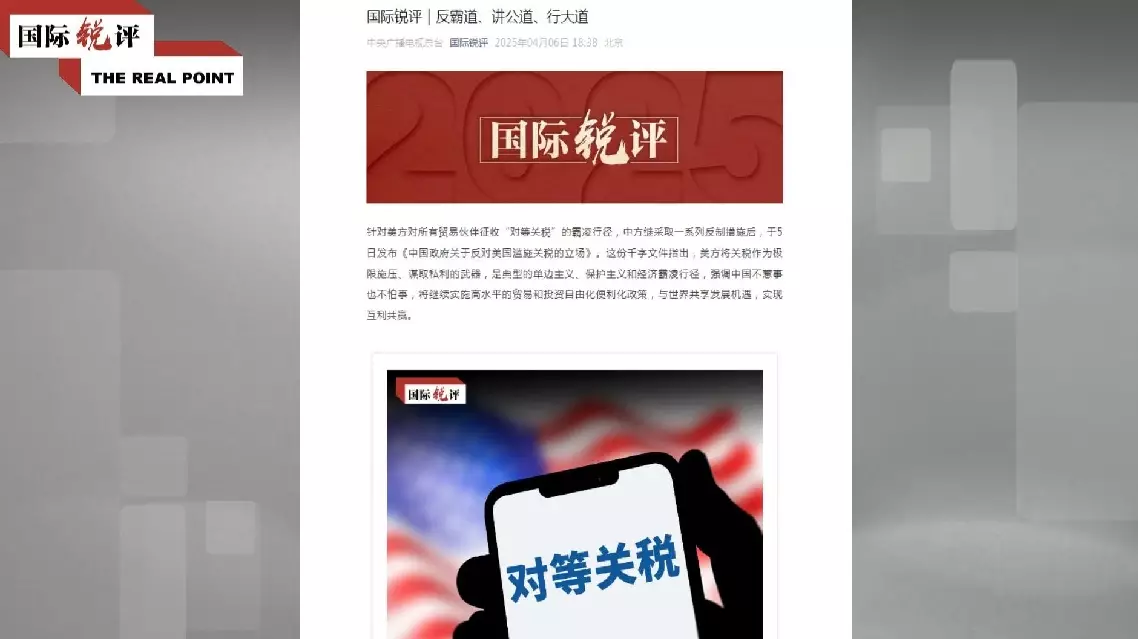
China opposes hegemony, upholds right path against sweeping U.S. tariffs: commentary



